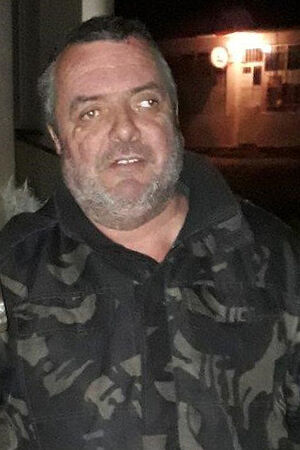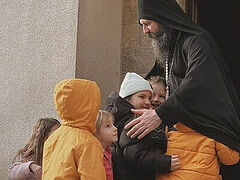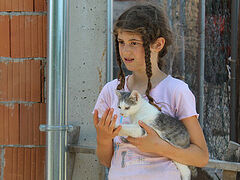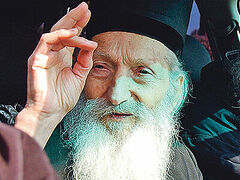 Предраг Витошевич Predrag was known by many nicknames, like any other famous and beloved person in our part of the world. But more often than not he was called Agush—no one knows why, and I never tried to find out why. Just Agush, and that’s it! He was called that from an early age, they say.
Предраг Витошевич Predrag was known by many nicknames, like any other famous and beloved person in our part of the world. But more often than not he was called Agush—no one knows why, and I never tried to find out why. Just Agush, and that’s it! He was called that from an early age, they say.
He looked frightening and funny at the same time. His left eye stared at you, always open wide and unable to close (probably because he was a preemie—he and his twin brother were born two months early). Then, he had a torn right ear—the price you pay for growing up in a war—during military exercises, some wreck of a soldier forgot to unload the rifle and it went off when Predrag was close by, so the bullet tore his ear. Some kind of monster, either the Terminator or Gwynplaine, a complete stranger, starts shouting at you, practically growling and demanding that you answer his important and pressing questions. Just picture it: a growling voice and one eye staring at you. Many people were terrified at the mere sight of him, of course. But once Predrag-Augush sees the desired effect achieved, he always finishes with a smile and an impromptu joke that is both amusing and indicative of his true self. He is a kind man who was unable and unwilling to judge anyone, and a man who suffered yet loved everyone.
When Serbs fled from the villages-turned-ghettos in the 1999 war in order to save their lives, Predrag and his ailing elderly parents stayed with us in Orahovac, in the house where they once lived with his brothers and their families. Their large house, hastily deserted, gradually fell into ruin.
Soon his elderly parents died and Predrag was left all alone. A lonely life in a house once full of life, a house that heard the laughter of several generations, saw many feasts and celebrations, where moments of joy and sadness were shared—all this on a street lined with equally somber, abandoned, dying houses. A street where our “beloved” Albanian neighbors rapidly began to erect their new homes. What occupied him, what was he thinking and feeling—our unflappable and non-judgmental Agush...?
We never heard a word of complaint from him. Not a word. Envy was alien to him
He had no income whatsoever except for the ridiculously minimal “assistance” from the state, not even enough to cover the cost of utilities. We locals kept wondering how he could support himself with so little money. But we never heard a word of complaint from him. Not a single word. Resentment was alien to him. As for us—oh, how we debated (and judged) the subtleties of economic policy; how we pried into our neighbors’ business to see if they had received more money than us; how we scrutinized the ins and outs of receiving social benefits from every possible source...! How busy were we, forgetting about each other in this whirlwind of life? One day, someone said mournfully and matter-of-factly: “Predrag is luckier than the rest of us. He lives as if completely unconcerned with worldly things; he is happy with what he has and reproaches no one—he’s a true Bohemian!”
He rarely left our enclave, only when it was necessary. Once his relatives, who moved to central Serbia, literally forced him to move to the town of Stalac near Nis, to a new house they purchased with money received from the sale of land in Kosovo. They thought Predrag would start a new and happy life there and forget his native land. That’s what they thought! Agush stayed there for a couple of weeks, pondered “all that stuff,” and opened up to his kin: “I’m better off in my native Orahovac. It’s my homeland. My Metohija is there." So long, my friends! Farewell. He returned to Orahovac, and this decision made our lives so much more colorful!
He spent most of his days outside, at any time of the year. But in the evening he would come back to his chilly home
He spent most of his days outside, at any time of the year. It seems to me that this was because of his memories. Try to spend the whole day all alone in your house and yard, the place where you were born, grew up and lived all your life, but where now desolation reigns supreme. That’s why he sought out people. But in the evening he’d return to his chilly home.
A miracle didn’t happen—he took to drinking. His friends reproached him, but never condemned him. Find yourself in such state, and see what you’ll do. They knew that he drank out of grief, to survive loneliness more easily. He didn't drink to excess or get dead drunk. He was always invited to our gatherings in Orahovac, mostly because of his ability to cheer up any company. This is why. Agush was irreplaceable! Be it Krstna Slavas, name days, birthdays, or baptisms—they never took place without Predrag. We would always give him a bag or two of food because we knew he often had no food at all, let alone warm meals. He behaved with dignity. He never abused anyone's hospitality, never used obscenities or acted silly. He thanked everyone in such a way that every host who treated him would always feel as though they, not Predrag, had been given help and paid honor.
He became a symbol of the Serbian part of Orahovac, and that's how. He was usually seen sitting on a bench at the village shop in the center of town, which was the most crowded area. To some extent, I think he acted like a fool for Christ. He “kept guidance” loudly to those who were late for work or didn't behave politely enough, in his opinion.
"It’s your luck that I'm not the one in charge of the country! Otherwise, everyone would have learned from me what order and discipline mean! Oh, I'll give it to you! Hey, you! You, in the hat! How about saying hello to the grandma? And help her carry her bag! Now, you! How do you park your car? I’ll give it to you!"
Of course, no one took offense at him. His remarks were fair and there was no reason to be offended.
He was taken to the clinic several times, where the doctors warned him to quit drinking. But once he was back home, Agush would sit again on his bench with a bottle of beer in his hand, and a fellow villager would help him “improve his health.”.
He liked to cheer the people; he couldn't stand it if everything was sad and gloomy around. People didn't always appreciate it. During the May holidays of his youth, he once put on women's folk clothes, draped necklaces over his neck, and danced wildly in front of the trumpeters. The people laughed until they dropped, and the musicians were bursting with laughter. But then his older brother came out, seized Predrag by the scruff of the neck, dragged him home and badly beat him, saying that he brought dishonor on his family. I later saw him sitting on a stone near his house and crying bitterly, wiping blood and tears from his face. He sobbed: I only wanted to cheer you up and make you happy! Why did you do that, brother?" It ended up being a sad holiday.
It was hard to see Predrag treading heavily in the evening to his house with blinded windows, carrying another bag of groceries. It was a dreadful loneliness. How could I condemn someone in such a situation? What good is it to give my “righteous advice”? What good is my “righteousness” whenk God gave me a family waiting for me at home, a job, and these are the only reasons why I didn’t lose myself drinking? Oh, judge not, that ye be not judged.
Eventually he did quit drinking. We kept strict watch and made sure that he “improved” his health only with food and not beer. From my office window, I could hear him solving all the world and European problems with unflagging humor, making his fellow Serbs, exhausted by life in the enclave, roar with laughter. No, life would have been so much sadder without Predrag, believe me.
One of Predrag's neighbors comes running in and says: "Our Agush has died. We went to his house to congratulate him—he's lying dead on his bed..."
But it did become just that—sad. Predrag has died. He died alone on the feast of the Holy Hierarch Nicholas. We had just celebrated a big feast—many people have their Slavas on this day. Tables laden with food, merrymaking, music, dancing by the church after the liturgy—we have all this, despite living in the ghetto. It’s joyful in the village administration offices, where we receive many guests. It's fun! I looked out of the window; Predrag wasn’t at his usual place. “He’s probably already gotten a present and took it to his home,” so I thought. I put on another cheerful song. No sooner had the dance started than one of Predrag's neighbors came running, and said, “Our Agush has died. We went to his house to congratulate him—but he is lying dead on the bed..." No more fun in the ghetto...
Dostoevsky wrote: “Everyone of us is guilty of everything before everyone else.” To my shame, I have to agree. How many times did we laugh at Predrag's jokes, never paying attention, or perhaps not wanting to see the pain that tormented him. We never did that, never have had a heart to heart talk, a cordial conversation, not in haste or just for laugh. I think it was only after Predrag’s death that many of us had the thought: Did I ever really pray for him once in my life? Shameful. We pray now, after his death.
I look from my office window at the bench where Agush used to perch every day. No, not a village fool or a drunkard, but a man who, worn out with suffering, couldn’t bear to live without helping someone else to smile. Who didn’t want to judge anyone and who never judged. It is so sad without him. God rest the soul of Predrag and forgive him all his transgressions, both voluntary and involuntary. Life goes on in the ghetto.



